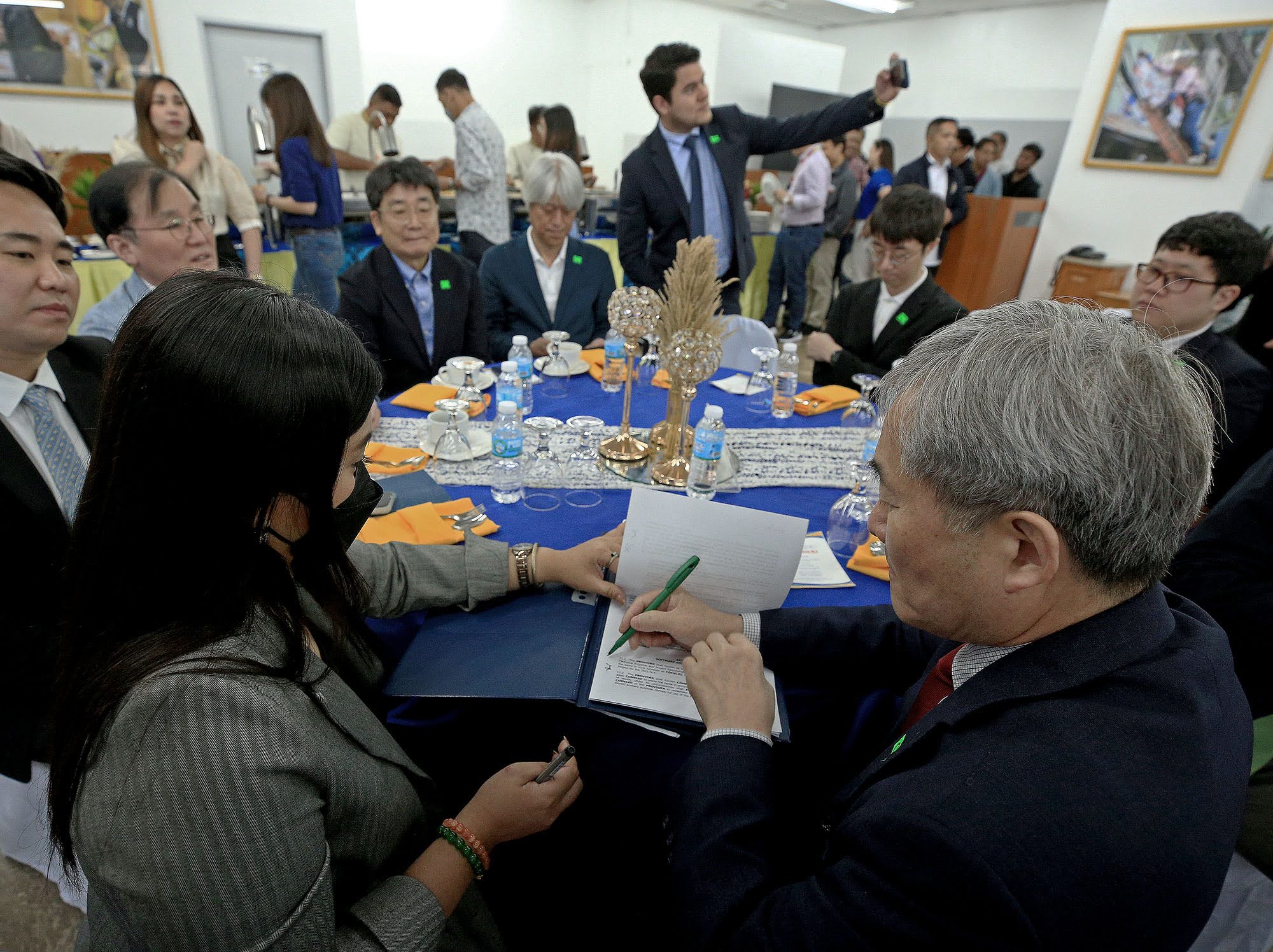
NEWPROVIDER Officials of Miru Systems Co. Ltd. led by its president Chung Jin-bok appear at the Commission on Elections on Monday for the signing of their P18-billion contract with the poll body. —RICHARD A. REYES
South Korean firm Miru Systems Co. Ltd. has agreed to open to the public the source code of its fully automated vote counting and audit system to assure that no irregularities would take place during the 2025 midterm elections, according to the Commission on Elections (Comelec).
This was among the agreements reached during the signing of the P18-billion contract for the Full Automation System with Transparency Audit/Count (Fastrac) project on Monday between Comelec Chair George Garcia and Miru president Chung Jin-bok.
According to Garcia, the seven commissioners of the Comelec en banc agreed to make the source code—the human readable instructions that define what the computer equipment will do—open to the public by making it accessible on Comelec’s website to test its vulnerabilities.
“During our talks, Miru agreed to this proposition. They are willing to make it public so it could be reviewed by anyone. This is the first time that this will happen, that the Comelec received such an offer,” he said in a press conference at the Comelec head office in Manila.
Under Section 12 of Republic Act No. 9369, or the Election Automation Law of 2007, Comelec is tasked to make the source code of the automated election system technology “available and open to any interested party or group which may conduct their own review thereof.”
In previous elections, the local source code review (LSCR) was conducted in October, but the application to participate was only open to a select group of people, particularly political parties, citizen’s arm and civil society groups. Information and technology groups recognized in the community are also eligible to apply to review the source code.
Track record
The LSCR aims to ensure that the technology functions as it should and that the source code is clean and without any embedded malicious code. The review will also identify any critical or major issues or errors that could potentially impact the outcome of the elections.
Garcia said Miru also offered to put 12,000 cameras in different polling places nationwide so that Comelec and other stakeholders could monitor activities during Election Day.
READ: Comelec awards P18-B poll deal to Korean-led group
Through a translator, Chung said they were willing to accommodate the customization requests of Comelec “to be transparent and further allay any issues and irregularities” in the conduct of the 2025 midterm national and local elections.
Comelec was earlier warned of allegations of malfunctioning electoral systems and irregularities involving Miru’s system used in past elections in the Democratic Republic of the Congo and Iraq.
But Miru dismissed these as “rumors,” noting that they were already cleared by the election bodies of the two countries and confirmed the accuracy of their machines during a manual recount.
More than a year before the 2025 elections, Comelec was also able to monitor reports of unscrupulous individuals alleging they could manipulate the upcoming polls with the help of their accomplices in the Comelec’s information technology department and Miru.
Garcia said the poll body has already coordinated with the National Bureau of Investigation to stop and arrest the people behind these false claims.
“We aim to have the most orderly and most trusted elections in 2025. And I emphasized to Miru that if they still want to participate in the next procurement projects of the Comelec, they should make sure that the 2025 elections will be done properly,” he pointed out.
Overseas voting contract
A notice to award was issued last month by Comelec to the joint venture of Miru and three local companies—Integrated Computer Systems, St. Timothy Construction Corp., and Centerpoint Solutions Technologies Inc.—which offered a bid of P17.99 billion for the Fastrac project.
This was below the P18.82-billion approved budget for the project, saving the government around P839 million.
The contract includes 110,000 automated counting machines, election management systems, consolidation and canvassing systems, ballot printing, ballot boxes and other peripherals.
The new machines would replace the 97,000 vote counting machines procured from London-based Smartmatic Corp., which were used in the previous three elections.
With the contract signed, Comelec expects Miru to start the mass production of the customized automated counting machines this April and complete the inventory by October.
Comelec has yet to award the Secure Electronic Transmission Services (SET) contract with a budget of P1.638 billion, which will be used to transmit election results using telecommunication networks, as well as the P465.8-million online voting and counting system that will be used for overseas voting. INQ